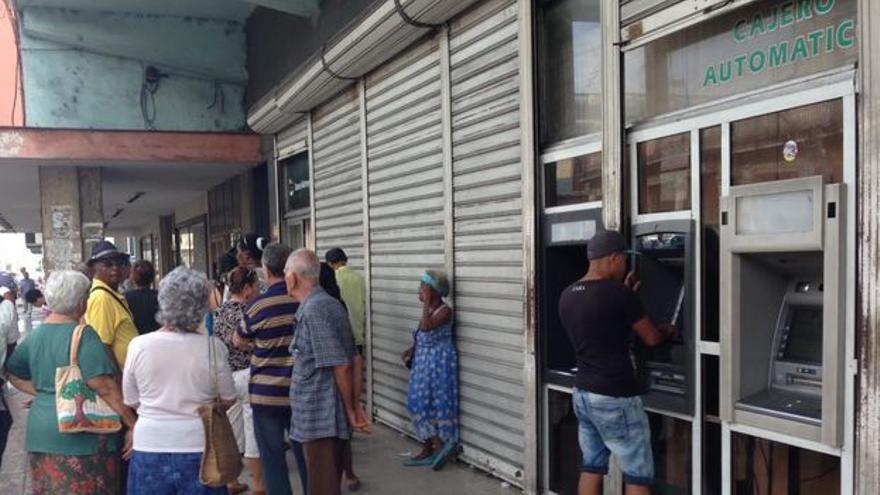
![]() 14ymedio, Havana, August 24, 2023 — The Cuban Prime Minister, Manuel Marrero, attacked micro, medium and small companies (SMEs) and other private businesses that “resist” the priority use of electronic payment channels. The measure, which represents the core of the country’s bancarización* banking reform process decreed at the beginning of August, has been criticized by some academics and officials as a partial solution, which “will not solve the problems of the Cuban economy.”
14ymedio, Havana, August 24, 2023 — The Cuban Prime Minister, Manuel Marrero, attacked micro, medium and small companies (SMEs) and other private businesses that “resist” the priority use of electronic payment channels. The measure, which represents the core of the country’s bancarización* banking reform process decreed at the beginning of August, has been criticized by some academics and officials as a partial solution, which “will not solve the problems of the Cuban economy.”
“No economic actor can deny customers the payment of services, products and other commercial and financial operations through the various electronic channels,” Marrero said during a work session with the directors of the Central Bank of Cuba (BCC).
Marrero stressed that businessmen were obliged, “where the conditions are created,” to accept any form of payment that the client chooses, although he did not mention that the shortage of cash is the reason why Cubans have to resort in a sustained way to virtual transactions.
For his part, the president of the BCC, Joaquín Alonso, repeated Marrero’s accusation against SMEs and said that he had “detected” the phenomenon in many provinces. He also admitted that many BCC officials lack “training” to correctly explain the bancarización banking reform process to the population and that this ignorance has caused countless obstacles. His solution? Wait for State TV’s Roundtable program and other information spaces, where both officials and customers will be informed step by step.
Interviewed by the Russian agency Sputnik, some professors and workers of state companies said they agreed with the banking reform effort but stressed that Cuba is not prepared to assume the magnitude of the process.
Luis René Fernández Tabío, professor at the Research Center for the International Economy of the University of Havana, said that the measure “does not solve the main problems of the economy, associated with the large fiscal deficit and the paradoxical contribution to this phenomenon of a group of state companies that contribute little or nothing to national income.”
The academic also listed other difficulties for the bancarización to provide positive results in the country: the weak growth of the Gross Domestic Product, the exchange rate mismatch – which he euphemistically defined as “failures” in daily exchange rates – and technological and energy deficiencies.
According to Fernández Tabío, the authorities must consider the problem “in an integral way and not in isolation,” because there will be “imbalances and problems” that will not be easy to solve. He also foresaw that the Cuban economy will continue to tend toward dollarization, not only because “the foreign currency behaves with greater stability,” but because private businesses do not have the slightest incentive “to maintain their savings in Cuban pesos.”
For Yanae Naredo, a marketing specialist associated with the SME Beep Beep, dedicated to software development, e-commerce has many benefits, but it’s likely that Cuba has “entered late” and with “not just a few drawbacks” to that type of market.
“The first impediment lies in logistics. Many consider that e-commerce is only a platform and a collection method, but it goes further. For example, there are transport problems and a lack of people available to deliver the products in a correct way, which hinders the process,” says Mario Lombao, director of Beep Beep.
Economist Yunier Morales, an employee of the state music company Egrem, says that Cuba lacks stable and reliable Internet connectivity, and until this is improved, electronic commerce will not work. Morales also notes more practical difficulties: the poverty of offers and the absence of a home product delivery structure, which many businesses hope to have. “Cuba arrived late to e-commerce,” he adds.
The complexity of the national economic panorama seems to have brought benefits, however, to the Island’s bitcoiners. A study carried out by the company Coingecko revealed that Cuba is the third cheapest country for the production of bitcoins, an industry that demands a large amount of energy and has been banned for this reason in several countries, starting with China, which had become the largest cryptocurrency manufacturer in the world. In Cuba, it only costs $7,890 dollars to “mine” a bitcoin, a price well below that of other countries in the region such as the United States ($46,280) or Uruguay ($67,300).
Despite the difficulties, Cubans – especially young people – are increasingly turning to Bitcoin in their transactions because they consider it a more stable currency than those that dominate the national economy. In a context of increasing surveillance of transactions by the Government, cryptocurrencies have, according to experts interviewed by 14ymedio, an additional benefit: they can’t be “confiscated.”
Translated by Regina Anavy
*Translator’s note: “Bancarización” is term used in Cuba and other Latin American countries that refers to government efforts to reduce the role of cash through a greater reliance on banks’ digital payment options. The term does not seem to have a counterpart in English so the Spanish term is used throughout this translation.
____________
COLLABORATE WITH OUR WORK: The 14ymedio team is committed to practicing serious journalism that reflects Cuba’s reality in all its depth. Thank you for joining us on this long journey. We invite you to continue supporting us by becoming a member of 14ymedio now. Together we can continue transforming journalism in Cuba.
